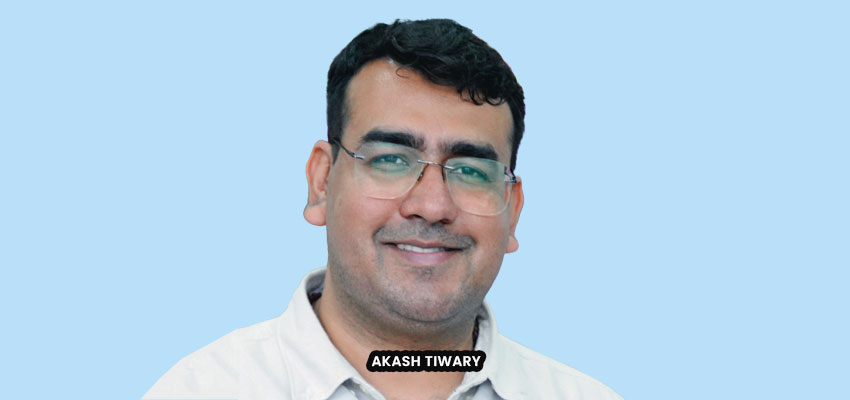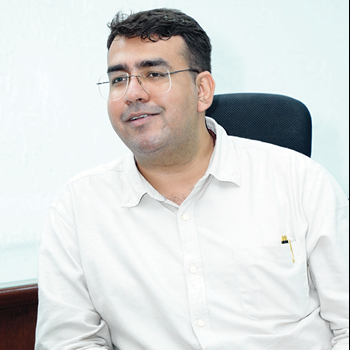Crafting Supply Chain Success

From pursuing mechanical engineering and rural management to now leading operations in India’s ultra-competitive quick commerce space, Akash Tiwary’s professional path is anything but conventional. Currently serving as Director of Operations at Zepto, he brings with him rich experience from his time at Flipkart and multiple startups, building a career at the intersection of scale, speed and strategic execution. In this conversation with Corporate Citizen, Akash shares insights from his journey, offering a valuable perspective on what it truly takes to lead and evolve in the dynamic world of operations and supply chain management
Corporate Citizen: Walk us through your professional journey so far.
Akash Tiwary: I began as a mechanical engineer and eventually took up a role at a company where I was creating educational content for foreign universities. After a year there, I pursued my MBA with a specialisation in rural management. Most of the roles I took up post-MBA were in startups and directly related to supply chain management, which eventually became my area of expertise.
My journey so far has been very rewarding because I’ve specialised in supply chain, although that was never the original intent. I was actually more inclined towards finance, but I happened to get recruited into a supply chain role in my first company. Over time, I discovered my love for the field and naturally gravitated towards it.
Today, my job encompasses all aspects of supply chain management, including financial management, P&L responsibility and people management. A large part of my work involves resolving abnormalities within the supply chain. If you ask me how I would define myself, I’d simply say 'a supply chain and logistics professional'.
CC: From mechanical engineering to rural management, and now to operations and supply chain, what led to these shifts in your journey?
I don’t see it as much of a shift, honestly. As a supply chain manager, I remain very close to what I studied in mechanical engineering. Our curriculum included aspects of production and operations management and operations research, both of which are foundational to what I do today. Operations research in particular, was a core subject for me.
Furthermore, at Institute of Rural Management Anand (IRMA), the MBA is rooted in rural management, but is structured like any general MBA course. We look at aspects of MBA from the lens of rural management, which is by no means constrained to rural management. It is unbounded and it is like any other MBA course. And frankly, I pursued an MBA simply because I didn’t know what else to do at that point. The choice was between a master’s in engineering and an MBA, and the opportunity for the latter came first, so I took it.
In life, most things aren’t planned. Some of the best things happen serendipitously. That’s been true for me. I believe luck has played a significant role in my journey. It's less of my own ability and talent, and more of the circumstances that have brought me where I am today.
"In life, most things aren’t planned. Some of the best things happen serendipitously. That’s been true for me. I believe luck has played a significant role in my journey"
— Akash Tiwary
CC: How did you make your way into wellknown names like Flipkart and Zepto?

I was working as an associate director of operations at a startup called Orinko, which had to shut down due to some reasons, despite the startup doing well by itself. At the time, Flipkart was hiring for a city head in Bengaluru, where I was based. I managed to crack the interview and it just worked out for me. There wasn’t any set pattern to it.
When you apply online, there’s a huge volume of resumes and it's tough to get noticed. Hence, like I said, it is a fair amount of luck that comes into the picture, and what you do when that luck comes to your door, is up to you. You could either turn that opportunity into a disaster, or turn it into a stepping stone and make something better out of it. I chose the latter.
After Flipkart, I co-founded a cattle feed manufacturing startup. Eventually, I returned to employment and joined Zepto as associate director of operations. Today, I am serving as zonal head and director of operations at the company.
CC: You were promoted from associate director to director of operations at Zepto within just one year. What contributed to such a rapid rise?
Honestly, I don’t know. I am not saying this to sound falsely humble, but a lot of these things are beyond our control. If you genuinely aim to deliver and consistently do what’s best for the company, good things will follow. There may be exceptions, but in most cases, if you’re acting in the organisation’s long-term interests, they would naturally want to retain you by offering better rewards and compensation.
I’ve been fortunate at Zepto, and I owe a lot to the organisation. But, this is by no means a testament to my skills and capability as much as it is to the growth potential at the organisation itself. Zepto had a lot of potential, and I could leverage it and turn it around for myself.
CC: Quick commerce is one of the most competitive sectors today. As someone leading operations in this space, could you walk us through what a typical day in your role looks like?
The first thing I do in the morning is look at yesterday's metrics. I need to understand where I was yesterday and what failed, so that I can correct it for today. This is what a disciplined professional should do. Alongside, while keeping a solid eye on your long-term strategy, you need to keep building your team. I spend a lot of time on people, relationship and stakeholder management.
I also focus on the long-term strategy and the financial aspects of running operations on a daily basis—whether we are making profits or losses. I keep experimenting and trying new things, shaking the system up and checking what our stresses are and further de-stressing them. That's also a part of my job, ensuring we are never delivering a subpar customer experience to anyone using our platform.
"As a startup founder, you enjoy the freedom to experiment with anything and everything. That freedom and the ability to choose and decide what the outcomes are, just by sheer hardwork and execution, is a lifetime learning"
CC: What role did you play in improving turnaround time (TAT) at Zepto?
Improving TAT is a core part of my role. I focus on solving the 20 per cent of problems that give 80 per cent of the impact, whether it is on the first mile side or the last.
On the first mile, better warehousing infrastructure, improved training, and efficient inventory management, all directly contribute to a faster TAT. On the last mile, it’s about sourcing better riders, monitoring their performance, and evaluating them based on both the number of orders they fulfill and the quality of service delivered.
Alongside this, we continuously fine-tune and optimise the system to build a cost-efficient infrastructure—all while ensuring there’s never a compromise on customer experience.
CC: What are some of the biggest operational challenges you face in quick commerce, and how do they differ from those in traditional e-commerce?

The biggest challenge, without a doubt, is speed. Traditional e-commerce works on a delivery timeline of about three days after an order is placed. In quick commerce, we operate on an ‘order plus 10 minutes’ model. Naturally, that level of speed comes at a cost. You need to be strategically located within dense urban clusters, which brings its own set of infrastructure challenges—from neighbourhood resistance to managing rider discipline.
What sets quick commerce apart is that you're essentially compressing traditional e-commerce principles into a much smaller operational box, and doing it at a speed that's nearly 100 times faster. It's a completely different game altogether, which can only be won with a strong technology backbone. Without tech platforms, it's nearly impossible to make 10-minute deliveries. Even the simplest item can’t reach a customer that fast unless you have microscopic visibility into every part of your supply chain.
CC: How did your experience at Flipkart help you at Zepto?
At Zepto, I serve as the zonal operations head, overseeing multiple cities—each with its own city head. I wouldn't have been able to manage this scale effectively without the exposure I gained at Flipkart. Progressing up the ladder teaches you first-hand, what your teams are doing, where they make mistakes, and what needs correction. That exposure was very important for me.
I’ve handled warehouses and logistics in the past, and that cumulative experience provides me with a better understanding of the supply chain. Fortunately, I’ve had the opportunity to explore all aspects of supply chain management, from procurement to last-mile delivery, and not just a single sphere. This breadth of experience has been an amazing journey.
The more exposure you gain, the stronger a leader you become, because you understand both the problems and the solutions that actually work. With experience, you tend to build a lot of expertise and you know what are the pitfalls to avoid. That kind of insight only comes with time. Working at Flipkart truly helped me establish a strong foundation at Zepto.
CC: You were also cofounder and MD at Gocarin Industries Pvt. Ltd. What are your biggest learnings from starting something from scratch?
At Gocarin, we began with manufacturing cattle feed and eventually diversified our offerings. From the branding to the manufacturing and to the sales, everything was fit, and within a short span of time, we had scaled up very well. Although my cofounders and I eventually parted ways, due to reasons unrelated to the potential of the business—the entire experience was phenomenal.
As a startup founder, you enjoy the freedom to experiment with anything and everything. Your time is yours. You don't owe it to anyone, which means if you want to work for 24 hours, you can work for 24 hours. That freedom and the ability to choose and decide what the outcomes are, just by sheer hardwork and execution, is a lifetime learning. I wouldn't change anything about it.
CC: From your experience, what do you think are the most important factors in building a strong operational model?
Attention to details is number one. You need to dissect your supply chain operations down to the smallest possible unit. To build a robust supply chain, you first need to know the details like the back of your hand. You need to know every segment of your operations better than the person actually executing it on the ground. That can only happen if you have robust visibility into your data, a solid IT infrastructure, and a very clear pathway for what the future should look like.
You cannot be doing things for the sake of doing them. Execution cannot happen out of thin air, it has to have purpose and direction. Moreover, to build a strong supply chain operation, you need exceptional talent. You need good people who understand the business and are willing to put in the time and effort required to build a supply chain from scratch. And, if you have a good combination of both, then there is absolutely nothing to worry about.
CC: How do you see the evolving role of supply chain management in today's techdriven ecosystem?
The need for supply chain management is not going away. Everything we do involves some element of supply chain management, and that’s simply unavoidable. Sure, delivery and distribution can happen online. For instance, if you’re delivering an ERP product, there may not be any physical delivery involved.
But, think about what you consume every day—fruits, vegetables. Or, what you trade— metals, bullion. All of it is fundamentally tied to supply chain management. Operations and supply chain are not going to be replaced. It’s an evergreen field. It’s not disappearing; it’s simply evolving and transforming.
CC: With AI increasingly entering logistics and supply chain management, what concerns you about it?
I don’t think there’s anything to be worried about. AI is a great addition to our arsenal—it helps us identify patterns more quickly and efficiently. People need to understand that value addition can happen in many ways. You don’t necessarily have to code, to contribute meaningfully. A system can handle that part, freeing up your time to focus on something else that adds even more value to the organisation. That could mean developing a new product, crafting a new strategy, or finding better ways to market your offerings.
AI is an enabler, not a limiter. It’s all about learning and contributing where it counts. If you’re able to do that within your organisation or in your area of influence, then AI should not concern you in the least.
"The first thing I do in the morning is look at yesterday's metrics. I need to understand where I was yesterday and what failed, so that I can correct it for today. This is what a disciplined professional should do"
CC: What mindset or values from the early stages of your career continue to serve you well even today?

I started earning at a very young age, working as a stringer for a newspaper, when I was thirteen. The work ethic I developed as a teenager has served me extremely well. At the core, I consider myself as an ethical professional, and that has always been my biggest strength. People rely on me because they know I won’t compromise on my ethics or values. They know what to expect from my style of management, and they trust me to deliver. If I can uphold that trust, I succeed not just as a professional, but as a person.
For me, adding value to people’s lives is incredibly important. As a supply chain manager, the value I bring, to both individuals and the broader economy, is what helps me rest easy at night and look forward to going back to work the next day. I am never tired of what I do. I don’t see it as something I need to quit or retire from early. I love what I do, and if you love what you do, happiness naturally follows.
CC: Is there any success mantra you'd like to share with us?
Be honest. There is no harm in admitting that you have failed. But, never take shortcuts in life—that's not going to get you anywhere. Moreover, keep learning. If you keep learning and improving yourself, remain humble, and are willing to learn from anyone, regardless of their position, while holding integrity as your highest principle, success will follow.
For me, ethics, integrity and a lifelong quest for learning, have always been at the forefront of shaping my career. I intend to keep doing that for as long as I can. Furthermore, no company would want to have you if you're not adding value in return. You can add value in multiple ways—by being a great people manager, by being a technocrat, or by being intelligent and contributing to the company's growth, helping it earn more.
All of these things ultimately help your organisation grow, and if your organisation grows, naturally, you grow too. If they realise that your presence is going to help them create more value over time, they will never want to let you go. As a professional, you should always ask yourself whether you’re justifying your salary. Are you delivering at least 10 or 20 times the value of the monthly salary you’re drawing? If the answer is yes, then you are truly adding value.
CC: Lastly, what message would you give to someone looking to build a career in operations and supply chain management?
In supply chain management, there are no fixed days or nights. Our job is to ensure the world runs like a well-oiled machine. That means no breaks, no holidays and no days off. It’s 24 hours a day, 7 days a week, 52 weeks a year. There is no room for downtime, because in supply chain, downtime means your consumers are going to be very angry with you.
Hence, if you’re looking to build a career in supply chain, you need to understand this fundamental truth: your supply chain should never stop, and your efforts to keep it running should reflect that commitment. It’s a tough profession, but an extremely rewarding one. Rewarding because the entire world depends on you to move materials from point 'A' to point 'B'—on time.